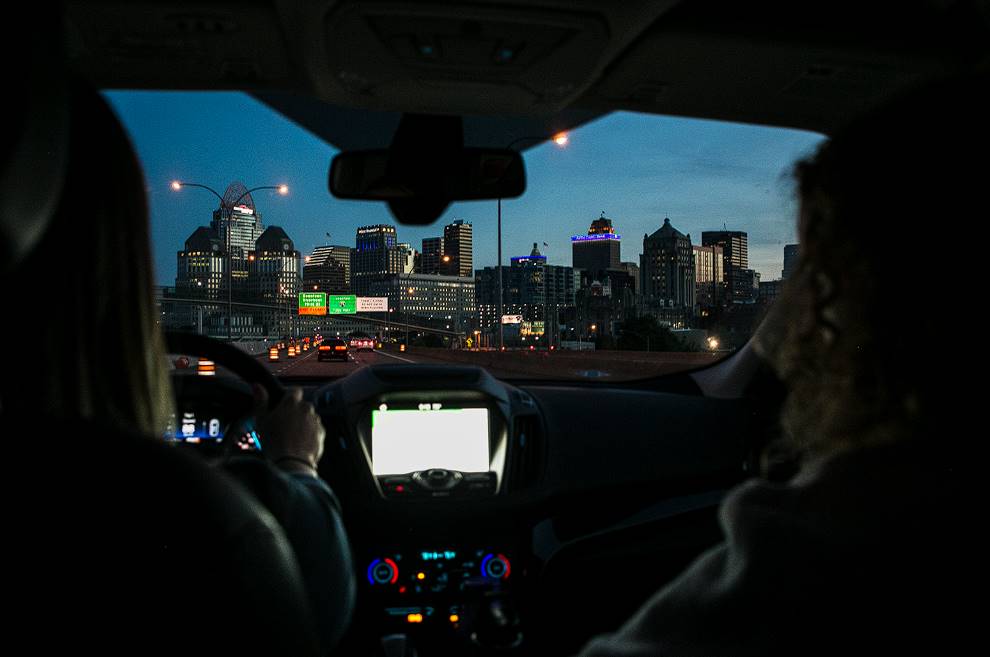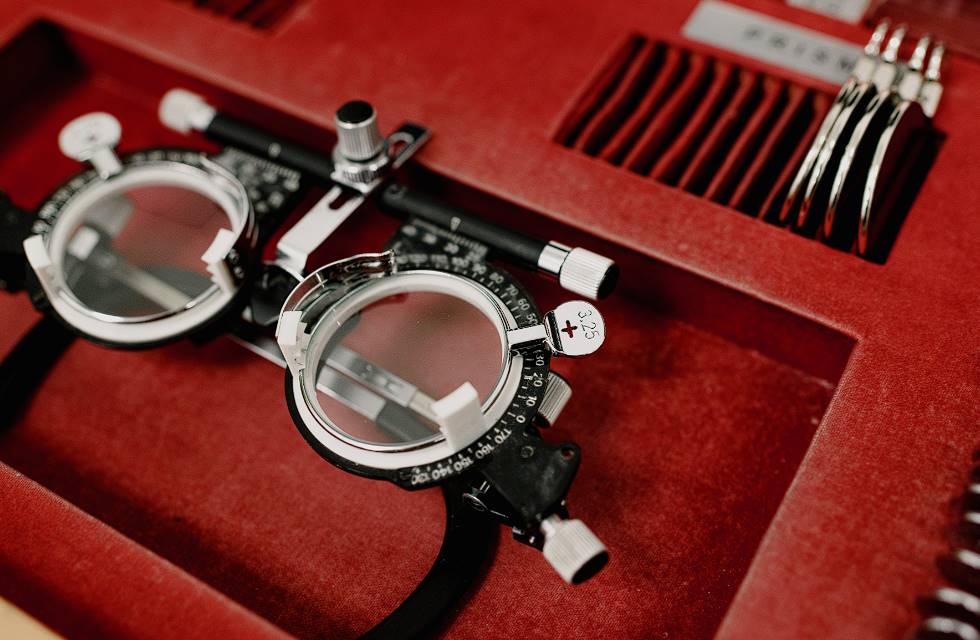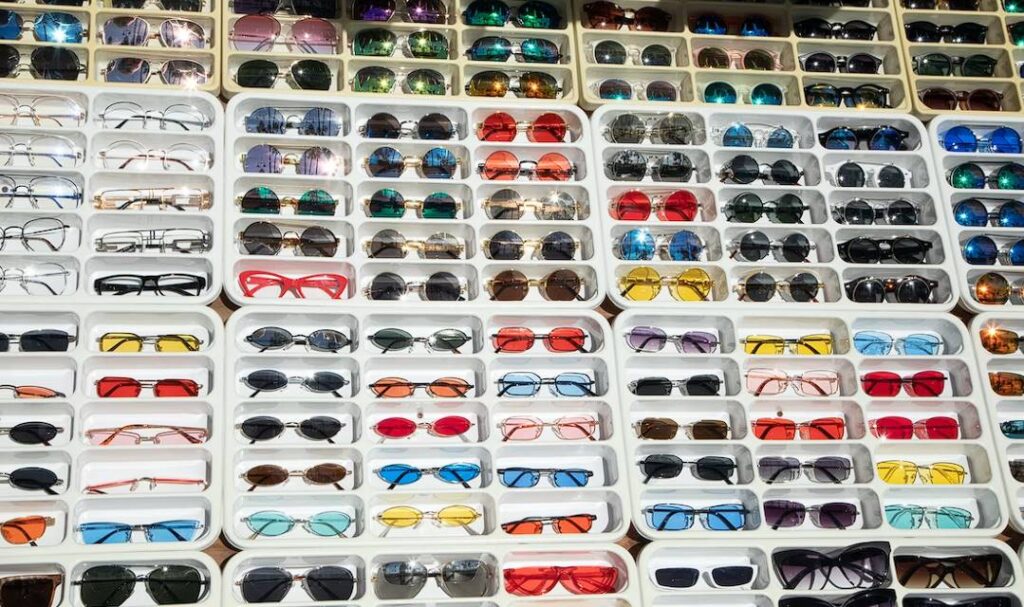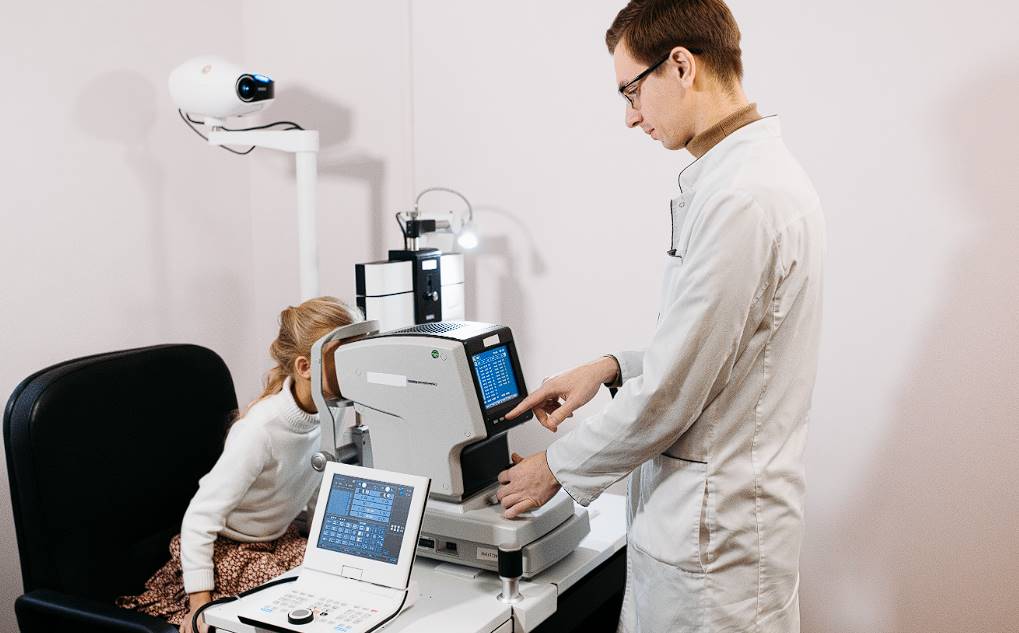Night driving glasses are specialised eyewear that may improve your visibility on the road at night. They have a yellow tint and can be purchased without a doctor's order. An anti-reflective coating is commonly found on them. Likewise, there are polarised night driving glasses available.
Some people, especially older people, have trouble seeing in dim conditions. After midlife, you may require twice as much illumination as you did when you were a young adult. Cataracts and other age-related eye conditions can reduce night vision.
What Are Night Driving Glasses?
Non-prescription night driving glasses feature yellow lenses ranging in tone from pale to deep amber. There is an anti-reflective coating on some night driving glasses.
By scattering and filtering out blue light, night driving glasses reduce glare. The wavelength and power of blue light are the highest of any colour in the visible spectrum. Due to its shorter wavelength, blue light is much more likely to create glare on the retina than other colours of light.
A steady supply of night-driving glasses has been on the market for a long time. These yellow lenses were designed with hunters in mind and were sold to them specifically as shooting glasses. Hunters continue to use them even in cloudy weather because they increase the visibility of flying birds against the background sky.
Conditions That Make It Harder To See At Night
A variety of factors impairs nighttime visibility. It would be best if you did not drive under these conditions.
Myopia.
Nearsightedness is another name for this condition. It indicates a problem with distant vision. It could be more challenging to see in low light, too. Night myopia describes a form of myopia that occurs after dark. This nighttime nearsightedness can be remedied by wearing corrective lenses.
Cataracts.
When you have cataracts, the lens in your eye becomes cloudy, which makes it more difficult to see. This condition will cause you to have trouble seeing during the day as well as at night.
Nyctalopia.
This is also known as night blindness. This condition does not cause total night blindness but can make it difficult to see in low light. Sometimes nyctalopia indicates a more serious health problem.
Glaucoma.
Glaucoma causes a reduction in one's field of peripheral vision, which can make it more difficult to see at night. Glaucoma is a condition that develops when fluid accumulates in the eye and causes damage to the optic nerve.
Retinitis Pigmentosa.
This inherited disorder is extremely uncommon. Because of the damage, it does to the retina's cells, night vision and peripheral vision suffer. These cells allow you to see in the dark because of their sensitivity to light.
A Lack Of Vitamin A.
Lack of this vital nutrient has been linked to blindness. Vitamin A-rich foods include:
- Carrots
- Eggs
- Leafy greens
- Pumpkin
- Sweet potatoes
Low light and nighttime vision problems are common symptoms of vitamin A deficiency in its early stages. Early medical intervention is key to reversing the effects of this deficiency.
Driving Glasses That Reduce Glare At Night
The blue light that causes glare at night can be blocked by wearing special driving glasses. The wavelength of blue light is the shortest, and it has the most energy of all the colours of the visible spectrum. Glare is more commonly brought on by blue light entering the eye.
Some people may find that wearing nighttime driving glasses helps reduce glare, but other research suggests that drivers would be safer without them. An ophthalmologist has expressed his reservations and stated that the tinted lenses utilised in night vision glasses are intended to restrict or minimise the amount of light that reaches the eye.
Adding an anti-glare coating could be a smart safety measure if you use glasses, prescription or not. This coating lessens the light reflected off your sunglasses' or eyeglasses lenses. The elimination of reflections allows for an increase in the amount of light that reaches the eyes. Those who struggle to see clearly while driving at night may benefit from having this coating applied to their lenses.
Can Night Driving Glasses Help?
According to some experts, you may not be able to see as well through your night driving glasses. Because less light enters your eyes because of the yellow lenses, vision is impaired.
They are more effective for daytime use. By eliminating blue light, they enhance contrast in natural light. Glasses like these first appeared as a necessity for hunters. They improve daytime contrast, making it easier for hunters to spot birds.
According to one study, those who wear night driving glasses have a more difficult time seeing pedestrians than those who do not. Using night driving glasses could increase reaction time by as much as 1.5 seconds.
The Advantages Of Wearing Night Driving Glasses
Reduced Glare
Wearing night driving glasses can drastically lessen eye strain caused by glare. Glare is caused by intense, blinding light flashes that come from car headlights, streetlights, or reflective surfaces and can impair vision and be uncomfortable. Night-driving glasses are made to alleviate this problem and make nighttime driving more pleasant and safe.
Night driving glasses have specially coated and tinted lenses that reduce glare from headlights. In order to reduce reflections and glare, anti-glare coatings are commonly applied to the lenses. This coating helps by allowing more light to reach the eyes by decreasing the light reflected off the lenses. Because of this, glare is greatly reduced, improving drivers' visibility of the road and their surroundings.
Improved Visual Clarity
Improved clarity of vision is another major benefit of night driving glasses. The low light of night brings hazards to the road, making it more difficult to see and focus on the road ahead. Night driving glasses are made to improve visibility in low-light conditions so that drivers can make safer choices.
Night-driving glasses enhance vision in a number of ways. To begin with, they have lenses that are optimised to reduce stray light and heighten clarity. Light scattering is effectively mitigated by these lenses, allowing for clearer, more defined vision. Night driving glasses improve visibility by limiting the spread of light, allowing drivers to make out road signs, traffic signals, and other potential hazards.
Increased Safety
When it comes to the well-being of drivers and other road users, night driving glasses are an invaluable tool. These specialised glasses provide a number of advantages that make driving in low-light conditions safer and less dangerous.
Night-driving glasses' ability to mitigate glare is an important safety feature. A major safety concern is the blinding glare of oncoming vehicles, streetlights, and reflective surfaces. Night-driving glasses solve this problem with their polarised lenses and anti-glare coatings.
These parts function as a unit to reduce the glare that reaches the user's eyes and filter out polarised light. Night driving glasses aid drivers by keeping their vision unimpaired and free of glare, allowing them to keep their attention on the road and any potential dangers ahead.
Appropriate For Different Drivers
Night driving glasses' adaptability means they can meet the needs of a wide variety of motorists. They're great for drivers of all ages, regardless of their eyesight or their driving conditions.
Improved visibility in low-light conditions is a major benefit of night driving glasses. These glasses are built to maximise visual acuity, so you can see clearly whether you're light-sensitive, have trouble with night vision, or want to wear them while driving.
Night driving glasses improve safety and reduce accident risk by eliminating or greatly diminishing the effects of glare, increasing contrast, and decreasing the intensity of scattered light.
Enhanced Contrast
Night-driving glasses' contrast enhancement capabilities make them an indispensable tool for better vision and safer driving in low-light conditions. Night driving glasses are tailored to enhance contrast, which is crucial to the visual processes of object discrimination and depth perception.
Reduced contrast from the nighttime lighting can make it difficult to see road signs, other vehicles, and pedestrians. That means being able to read road signs, spot people walking around, and identify hazards. Night driving glasses improve contrast, allowing drivers to see more clearly and make safer decisions in low-light conditions.
Minimised Eye Fatigue
In order to keep drivers alert and focused during long nighttime drives, night driving glasses are an essential accessory. Long periods of driving in low light can cause eyestrain, headaches, and blurred vision. Night driving glasses were developed to combat this fatigue and make for a more pleasant driving experience.
The eyes have to constantly adapt to the contrast between the bright headlights and the darker surroundings, which can lead to fatigue. These sudden shifts in brightness can cause eyestrain and discomfort.
Night-driving glasses help with this problem by limiting the amount of light entering the eye. These glasses' specialised lens coatings and tints perform like filters, shielding the eyes from harmful light levels. Night driving glasses provide a uniform illumination level, reducing strain on the eyes and fatigue by decreasing the contrast between bright and dark areas.
Lower Chance Of Accidents
It is especially important to wear night driving glasses when driving at night because they greatly reduce the likelihood of an accident. There are many ways in which these specialised glasses improve driver safety and cut down on accidents.
When driving at night, glare from other vehicles' lights, streetlights, and other reflective surfaces is one of the most troublesome obstacles. This glare can be so intense that it temporarily impairs one's ability to see, making it dangerous to drive in.
Night driving glasses incorporate anti-glare coatings and polarised lenses to solve this problem. These parts effectively cut down on glare by blocking the path of polarised light to the eyes. Night driving glasses reduce the risk of accidents by allowing drivers to see more clearly and stay in command of their vehicles in low-light conditions.
Tips For Choosing The Right Night Driving Glasses
Here are some things to consider when picking out a pair of night driving glasses:
Research Reputable Brands:
In the first place, you should look into the best night driving glasses brands available. If you need to wear glasses while driving at night, get a pair from a reputable brand.
Look Up Customer Feedback And Ratings.
Before purchasing a new set of night driving glasses, check out how well previous buyers have received them. The opinions of other motorists who have tried the glasses will be gleaned from this. Listen for compliments on how well the glare was muffled, how clear everything was, and how satisfied people felt overall.
Considering Lens Color And Tint
Night-driving glasses typically come in a variety of lens tints and colours to choose from. Choose lenses with a yellow or amber tint because these colours can effectively improve contrast and visibility, even in low-light environments. Lenses that are excessively dark or mirror-like should be avoided because they can reduce visibility.
Consider Frame Fit And Design
Think about the shape of your face and how the frame fits. Choose frames that won't weigh you so much that you can wear them all day. Check that the glasses don't slip or hurt your face when you wear them. Nose pads and temple arms can be adjusted for a personalised fit.
Consider The Lens's Quality And Durability.
The lenses of your night driving glasses should be of high quality and long-lasting. Lenses should be scratch- and shatter-proof and offer high levels of optical clarity. Lenses of this calibre prevent any blurring or hazing from occurring.
Seek Professional Advice From An Optometrist
Seek the advice of a qualified optometrist or eye care professional when shopping for night driving glasses. They are qualified to determine your optical requirements and make appropriate recommendations. An optometrist can advise you on their compatibility if you need corrective lenses.
Look For Anti-Glare Coating
Make sure the lenses of the night driving glasses are treated to prevent glare. This coating aids in cutting down on reflections and glare, allowing for better visibility and less strain on the eyes.
Prescription Compatibility
Make sure the night driving glasses are compatible with your prescription if you need to wear regular glasses. There are night driving glasses available that can be worn over your current glasses or with prescription lenses. Check to see that the glasses' prescription matches your needs.
Conclusion
Night driving glasses are specialized eyewear designed to improve visibility on the road at night. They have a yellow tint and can be purchased without a doctor's order, with an anti-reflective coating and polarised options available. These glasses are designed to scatter and filter out blue light, which is the highest wavelength and power of any color in the visible spectrum. They are particularly useful for older drivers who have trouble seeing in dim conditions, as they may require twice as much illumination as they did in their youth.
Several factors impair nighttime visibility, including myopia, cataracts, nyctalopia, glaucoma, retinal pigmentosa, and a lack of vitamin A. Night driving glasses can help reduce glare by blocking the blue light that causes glare at night. The wavelength of blue light is the shortest and has the most energy of all the visible spectrum.
Some experts believe that wearing night driving glasses helps reduce glare, but other research suggests that drivers would be safer without them. Anti-glare coatings are commonly applied to the lenses, allowing more light to reach the eyes by decreasing the light reflected off the lenses. This greatly reduces glare, improving drivers' visibility of the road and their surroundings.
Improved visual clarity is another major benefit of night driving glasses. They have lenses optimized to reduce stray light and heighten clarity, allowing for clearer, more defined vision. Night driving glasses also increase safety by mitigating glare from oncoming vehicles, streetlights, and reflective surfaces. Night driving glasses are suitable for drivers of all ages, regardless of their eyesight or driving conditions.
In conclusion, night driving glasses are a valuable tool for drivers who struggle with night vision, cataracts, and other eye conditions. They offer improved visibility, safety, and adaptability, making them suitable for drivers of all ages. Night driving glasses are essential for drivers to improve safety and reduce accident risk by enhancing contrast, minimizing eye fatigue, and reducing the likelihood of accidents. These glasses are designed to reduce the amount of light entering the eye, providing a uniform illumination level and reducing strain on the eyes. They also help reduce the chance of accidents by blocking the path of polarised light to the eyes, allowing drivers to see more clearly and stay in command of their vehicles in low-light conditions.
Content Summary:
- Night driving glasses are specialised eyewear that may improve your visibility on the road at night.
- Likewise, there are polarised night driving glasses available.
- Cataracts and other age-related eye conditions can reduce night vision.
- There is an anti-reflective coating on some night driving glasses.
- By scattering and filtering out blue light, night driving glasses reduce glare.
- A steady supply of night-driving glasses has been on the market for a long time.
- It indicates a problem with distant vision.
- Night myopia describes a form of myopia that occurs after dark.
- This nighttime nearsightedness can be remedied by wearing corrective lenses.
- Lack of this vital nutrient has been linked to blindness.
- Vitamin A-rich foods include: Carrots Eggs Leafy greens Pumpkin Sweet potatoes Low light and nighttime vision problems are common symptoms of vitamin A deficiency in its early stages.
- The blue light that causes glare at night can be blocked by wearing special driving glasses.
- Glare is more commonly brought on by blue light entering the eye.
- Some people may find that wearing nighttime driving glasses helps reduce glare, but other research suggests that drivers would be safer without them.
- An ophthalmologist has expressed his reservations and stated that the tinted lenses utilised in night vision glasses are intended to restrict or minimise the amount of light that reaches the eye.
- Adding an anti-glare coating could be a smart safety measure if you use glasses, prescription or not.
- This coating lessens the light reflected off your sunglasses' or eyeglasses lenses.
- The elimination of reflections allows for an increase in the amount of light that reaches the eyes.
- According to some experts, you may not be able to see as well through your night driving glasses.
- Wearing night driving glasses can drastically lessen eye strain caused by glare.
- Night-driving glasses are made to alleviate this problem and make nighttime driving more pleasant and safe.
- Night driving glasses have specially coated and tinted lenses that reduce glare from headlights.
- Night driving glasses are made to improve visibility in low-light conditions so that drivers can make safer choices.
- Night-driving glasses enhance vision in a number of ways.
- These specialised glasses provide a number of advantages that make driving in low-light conditions safer and less dangerous.
- Night-driving glasses' ability to mitigate glare is an important safety feature.
- Night-driving glasses solve this problem with their polarised lenses and anti-glare coatings.
- Improved visibility in low-light conditions is a major benefit of night driving glasses.
- Night driving glasses improve safety and reduce accident risk by eliminating or greatly diminishing the effects of glare, increasing contrast, and decreasing the intensity of scattered light.
- Night-driving glasses' contrast enhancement capabilities make them an indispensable tool for better vision and safer driving in low-light conditions.
- Night driving glasses improve contrast, allowing drivers to see more clearly and make safer decisions in low-light conditions.
- In order to keep drivers alert and focused during long nighttime drives, night driving glasses are an essential accessory.
- Long periods of driving in low light can cause eyestrain, headaches, and blurred vision.
- Night driving glasses provide a uniform illumination level, reducing strain on the eyes and fatigue by decreasing the contrast between bright and dark areas.
- It is especially important to wear night driving glasses when driving at night because they greatly reduce the likelihood of an accident.
- There are many ways in which these specialised glasses improve driver safety and cut down on accidents.
- When driving at night, glare from other vehicles' lights, streetlights, and other reflective surfaces is one of the most troublesome obstacles.
- Night driving glasses incorporate anti-glare coatings and polarised lenses to solve this problem.
- If you need to wear glasses while driving at night, get a pair from a reputable brand.
- Night-driving glasses typically come in a variety of lens tints and colours to choose from.
- The lenses of your night driving glasses should be of high quality and long-lasting.
- Seek the advice of a qualified optometrist or eye care professional when shopping for night driving glasses.
Frequently Asked Questions
Yes, there are night driving glasses available that can be worn over your existing prescription glasses. These glasses provide an additional layer of anti-glare protection and enhance visibility, making them convenient for individuals who require vision correction.
Night-driving glasses are generally suitable for most individuals who experience difficulty driving at night or in low-light conditions. However, it is recommended to consult an eye care professional to determine if these glasses suit your specific vision needs.
No, night driving glasses are beneficial for all drivers who frequently drive at night or in low-light conditions. Whether you are a professional driver or a commuter, these glasses can significantly improve your visibility and reduce the risk of accidents.
While night driving glasses significantly reduce glare, they cannot eliminate it. These glasses are designed to minimise the intensity of glare and improve visual clarity. However, it is important to remain cautious and attentive while driving, especially in the presence of bright headlights or reflective surfaces.
Night driving glasses are specifically designed for low-light conditions and may not provide the same benefits during daylight hours. It is recommended to wear them primarily during nighttime driving or in situations with reduced lighting. For optimal vision during the day, it is advisable to use sunglasses with appropriate UV protection.










